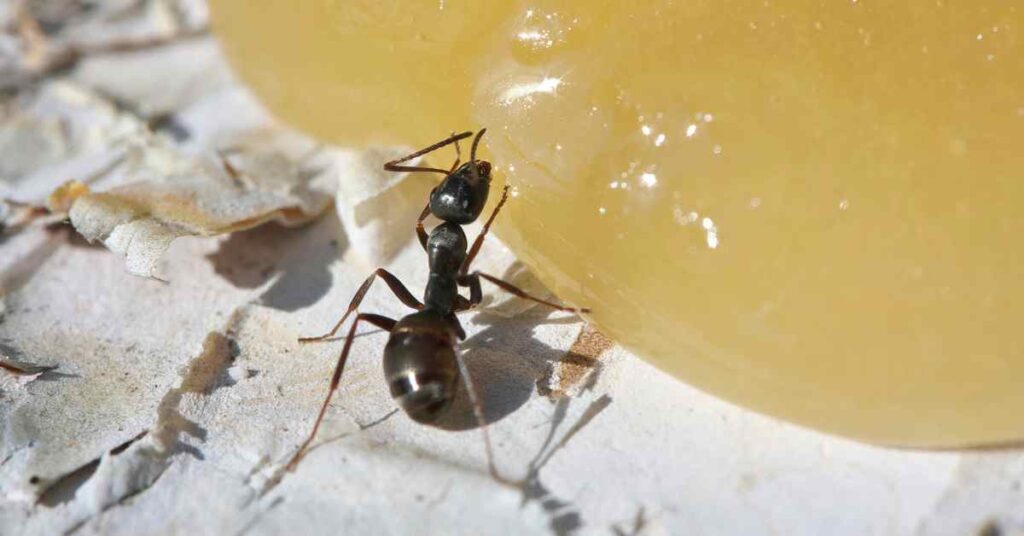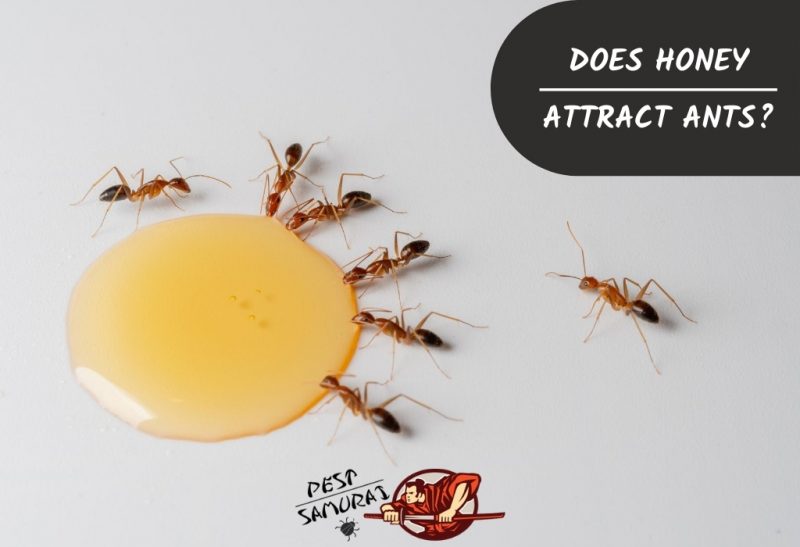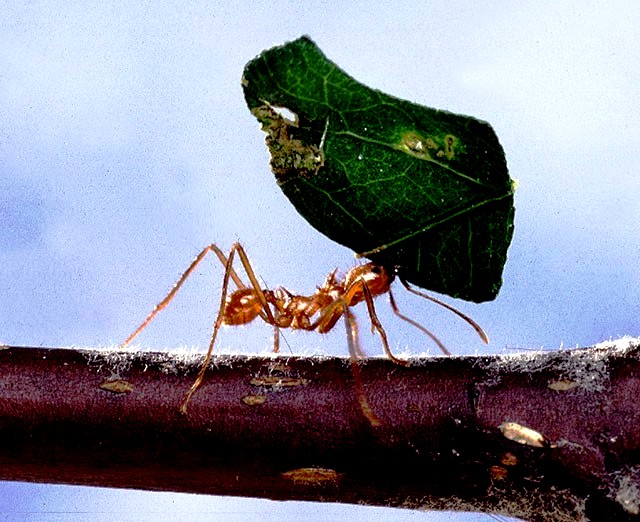Does Honey Attract Ants? A Comprehensive Guide To Understanding The Science Behind It
Honey is one of nature's most fascinating creations, but does honey attract ants? This question has puzzled many homeowners and nature enthusiasts alike. Understanding the relationship between honey and ants is essential for managing household pests and appreciating the intricate workings of nature. In this article, we'll explore this phenomenon and provide actionable insights to help you manage ants effectively.
Ants are naturally drawn to sweet substances, and honey, with its rich sugar content, often becomes a target for these tiny creatures. Whether you're a gardener, a beekeeper, or simply someone who enjoys honey, knowing how ants interact with honey can help you take preventive measures. In this article, we'll dive deep into the science behind this attraction and provide practical solutions.
By the end of this article, you'll have a comprehensive understanding of whether honey attracts ants, why it happens, and how you can manage the situation effectively. Let's begin by exploring the science behind this fascinating interaction.
Read also:June 17 Birthdays Celebrating Remarkable Lives And Contributions
Table of Contents
- The Science Behind Honey Attracting Ants
- Why Do Ants Love Honey?
- Types of Ants That Are Attracted to Honey
- Understanding the Composition of Honey
- Preventive Measures to Keep Ants Away from Honey
- Natural Repellents for Ants
- Common Mistakes People Make When Dealing with Ants
- Frequently Asked Questions About Honey and Ants
- The Environmental Impact of Ants and Honey
- Conclusion: Does Honey Attract Ants?
The Science Behind Honey Attracting Ants
Honey, a natural sweetener produced by bees, is composed primarily of sugars such as fructose and glucose. These sugars are highly attractive to ants, which rely on sweet substances for energy. Ants have specialized sensory organs that allow them to detect sugar molecules in their environment. When ants encounter honey, they perceive it as a valuable food source.
The attraction between honey and ants can be explained by the ants' foraging behavior. Ants are programmed to seek out and bring back food to their colonies. Honey, with its high sugar content, fits perfectly into their dietary needs. Additionally, ants release pheromones to mark trails, guiding other ants to the source of the food. This behavior often leads to swarms of ants converging on honey jars or containers.
How Ants Detect Sugar
Ants possess antennae that are highly sensitive to chemical compounds. These antennae can detect even trace amounts of sugar in the air. Once an ant locates a sugar source, it communicates this information to its colony through pheromones. This communication system ensures that the entire colony benefits from the discovery.
Why Do Ants Love Honey?
Honey provides ants with an energy-rich food source that is essential for their survival. Ants consume carbohydrates to fuel their activities, and honey is an excellent source of these nutrients. Moreover, honey contains trace amounts of vitamins and minerals that contribute to the overall health of the colony.
Does honey attract ants? The answer lies in the nutritional value of honey. Ants are not only attracted to the sweetness but also to the complex composition of honey, which includes enzymes, amino acids, and antioxidants. This combination makes honey an irresistible treat for ants.
Nutritional Benefits of Honey for Ants
- High carbohydrate content for energy
- Enzymes that aid digestion
- Trace minerals for overall health
- Antioxidants that boost immunity
Types of Ants That Are Attracted to Honey
Not all ants are equally attracted to honey. Some species are more likely to seek out sweet substances, while others prefer proteins or fats. However, certain species are known for their strong affinity for honey. These include:
Read also:Susana Gomez Age A Comprehensive Look Into Her Life Career And Legacy
- Sugar ants
- Pharaoh ants
- Argentine ants
- Odorous house ants
Each of these species has unique characteristics that make them effective at locating and exploiting honey as a food source. Understanding the behavior of these ants can help you implement targeted pest control strategies.
Behavioral Patterns of Honey-Seeking Ants
Ants that are attracted to honey often exhibit specific behaviors. They may form trails leading directly to the honey source, recruit additional foragers, and establish temporary nests nearby. Recognizing these patterns can help you identify and address ant infestations promptly.
Understanding the Composition of Honey
Honey is a complex substance composed of various sugars, enzymes, and other compounds. The primary components of honey include:
- Fructose
- Glucose
- Water
- Enzymes
- Minerals
These components contribute to honey's sweetness and nutritional value, making it an ideal food source for ants. The high sugar content of honey is particularly appealing to ants, as it provides the energy they need to sustain their activities.
How Honey's Composition Attracts Ants
The combination of sugars, enzymes, and minerals in honey creates a perfect storm for attracting ants. The fructose and glucose content provides immediate energy, while the enzymes aid in digestion. This synergy makes honey an irresistible treat for ants.
Preventive Measures to Keep Ants Away from Honey
Managing ants around honey requires a combination of preventive measures and proactive strategies. Here are some effective ways to keep ants away from your honey:
- Seal honey containers tightly
- Store honey in airtight containers
- Clean spills and crumbs immediately
- Use ant-proof storage solutions
- Regularly inspect for ant trails
By implementing these measures, you can significantly reduce the likelihood of ants being attracted to your honey supply.
Creating an Ant-Proof Environment
Ant-proofing your home involves identifying and eliminating potential entry points for ants. Sealing cracks, gaps, and other openings can prevent ants from accessing your honey. Additionally, maintaining cleanliness and hygiene in your kitchen can discourage ants from entering in the first place.
Natural Repellents for Ants
If you prefer natural solutions, there are several effective ant repellents you can use. These include:
- Vinegar
- Lemon juice
- Coffee grounds
- Cinnamon
- Peppermint oil
These natural repellents work by disrupting the ants' pheromone trails, making it difficult for them to locate food sources. Incorporating these solutions into your pest control routine can help keep ants at bay.
How Natural Repellents Work
Natural repellents interfere with the ants' sensory organs, preventing them from detecting food sources. For example, vinegar and lemon juice create a barrier that ants are reluctant to cross. Similarly, peppermint oil masks the scent of food, making it harder for ants to locate it.
Common Mistakes People Make When Dealing with Ants
Many people make mistakes when dealing with ants and honey. Some common errors include:
- Ignoring early signs of ant infestations
- Failing to clean up spills promptly
- Using ineffective repellents
- Not sealing containers properly
Avoiding these mistakes can help you manage ants more effectively and prevent them from being attracted to your honey.
Learning from Mistakes
By recognizing and addressing these common mistakes, you can develop a more effective strategy for managing ants. Regular inspections, prompt cleaning, and proper storage are key to preventing ant infestations.
Frequently Asked Questions About Honey and Ants
Q: Does honey attract ants?
A: Yes, honey attracts ants due to its high sugar content and nutritional value.
Q: How can I keep ants away from my honey?
A: Store honey in airtight containers, clean spills promptly, and use natural repellents like vinegar or peppermint oil.
Q: Are all ants attracted to honey?
A: While many species of ants are attracted to honey, some prefer proteins or fats over sweets.
The Environmental Impact of Ants and Honey
The relationship between ants and honey has broader implications for the environment. Ants play a crucial role in ecosystems by aerating soil, dispersing seeds, and controlling pest populations. However, when ants are attracted to human food sources like honey, they can become pests.
Managing ants effectively requires balancing pest control with environmental considerations. By using natural repellents and preventive measures, you can minimize the impact of ants on your honey supply while preserving their role in the ecosystem.
Sustainable Pest Management
Sustainable pest management involves using eco-friendly methods to control ants. This approach not only protects your honey but also supports biodiversity and ecosystem health.
Conclusion: Does Honey Attract Ants?
In conclusion, honey does attract ants due to its high sugar content and nutritional value. Understanding the science behind this attraction and implementing effective preventive measures can help you manage ants around your honey supply. By following the tips and strategies outlined in this article, you can enjoy your honey without worrying about ant infestations.
We invite you to share your thoughts and experiences in the comments section below. Your feedback helps us improve and provide more valuable content. Don't forget to explore our other articles for more insights on pest management and natural living.


